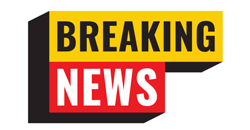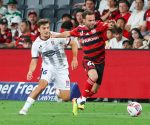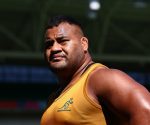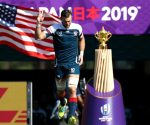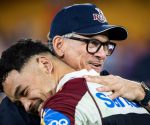A rookie coach for a home World Cup at 61? It might work for the Wallabies, but here’s why it probably won’t
It might work. Les Kiss will take the Wallaby tiller as an international head coach rookie at age 61 with a dozen or so Tests before his nation hosts the Rugby World Cup.
Test rugby is as different from club rugby as being a head coach is from being an assistant; going deep in a World Cup is even more distinct from getting to a grand final in Super Rugby as competing in a home Cup to a foreign campaign.
Starting anything new after 60 is no picnic, unless it is literally a park picnic.
Steve Hansen ended his long Test head coach career two years younger than Kiss will be when he begins, even if he and Ian Foster (still under 60) walked like old uncles down the fairway.
Michael Cheika assumed the head role for the Wallabies when he was 47. Rassie Erasmus was 45 when he became South Africa’s headman. Andy Farrell was just 43 when he took over in Ireland, after a three-year apprenticeship under Joe Schmidt.
Breakdancing Razor Robertson turned 50 on the All Black job in his first season; as did cool Fabien Galthie when he took over France. Veteran Scottish head man Gregor Townsend is still just 51, new Puma coach Felipe Contepomi 47 and Steve Borthwick in his mid-40s.
The only recent 60-ish head coach hire that worked was Joe Schmidt (born 1965) but he became a head Test coach at age 47. Eddie Jones’ infamous crash-and-burn was performed at age 63; his last good year of performance was at age 59 in Japan.
It might work. But it will be unusual.
Schmidt is looking to ride off into the rugby sunset with one last career-defining triumph over his pupil Farrell. If he was, right now, 55, Schmidt would be planning the 2027 Cup.
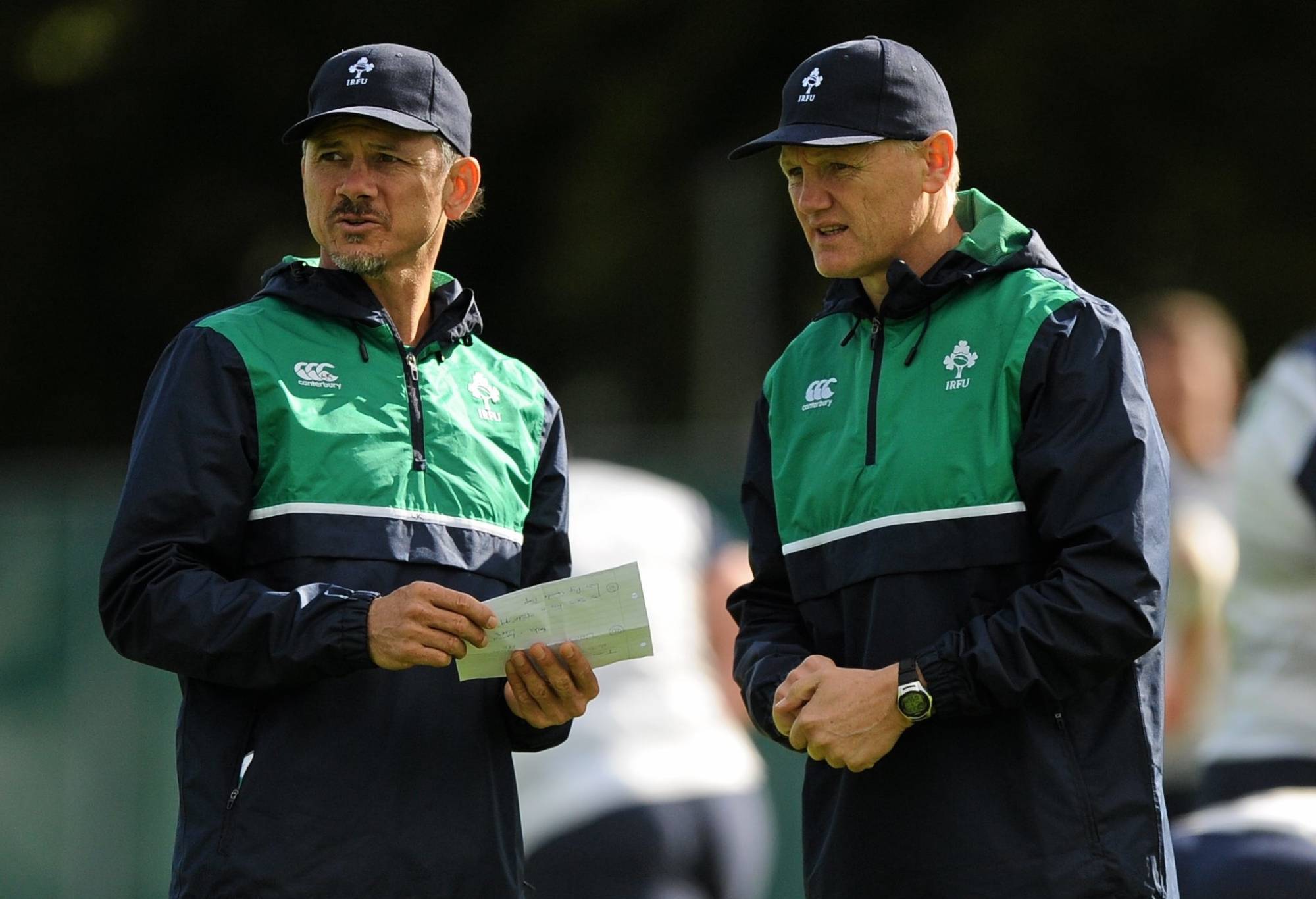
Ireland head coach Joe Schmidt, right, was assisted by Les Kiss. (Photo by Sportsfile/Corbis/Sportsfile via Getty Images)
It might work. If Kiss has learned by losing.
As the defensive coach for the Springboks in 2002, Kiss would have learned hard lessons: a record 3-53 loss to England at Twickenham, a 10-30 drubbing by France, 38 and 31 points conceded by the Boks to the Wallabies, and a 21-point defeat by the All Blacks in the Cake Tin en route to the Tri Nations wooden spoon, averaging 35 points conceded per match.
After that baptism of fire, Kiss continued in the role of assistant, for Australia Under 21, Waratahs, Australia A, and Ireland (half a dozen years with Declan Kidney and then under Schmidt in 2014 and 2015, experiencing the highs of back-to-back Six Nations titles and the customary Irish quarterfinal exit in the 2015 World Cup) before his first directorship (at Ulster) in 2015.
In his first season, Ulster finished fourth in the Pro12 and did not qualify for the Champions Cup knockouts, in his second, the same, but slipped in their third season and the 2017-2018 campaign became known as the ‘basket case’ season (no knockouts and horrific off-pitch scandals). Kiss resigned over Christmas and landed his first head coach job in March of 2018, at now defunct London Irish, for five seasons, again under Kidney (as DOR).
His best finish during that time was fifth place in the Premiership (the final year of the club); with a 10-10 record.
It might work.
But his resume differs from that of the last Cup’s semifinalist coaches, Cheika, Erasmus, Robertson, and Borthwick, all of whom were seen as coaches when yet players, all oozing confidence even when unjustified, all with trophies in their background, striding colossuses and a bit oddball at times, the mark of the modern Test coach winner.
One of the surprise coaching stars of 2023 was Simon Raiwalui, who had coached packs in the Top 14 under Cheika as well as the Wallaby forwards and took Fiji into a quarterfinal as part of a 6-win 4-loss one-season stint. He was, at the time, 48. He talked openly about the stress of Test footy, the travel, and the things he missed. Simon did the smash-and-grab Eddie talked about but could not deliver with superior resources.
It might work. To be more of the coaching troubadour, the journeyman who takes all the lessons from life and knits them together in a way translatable to Test rugby, and wins.
What can we tell from the early Kiss era at the Queensland Reds?

(Photo by Pete Dovgan/Speed Media/Icon Sportswire via Getty Images)
In 2024, the Reds won eight and lost six, built a positive 104-point 20-try margin in the 14-match regular season, and were well-beaten by 6-try Chiefs in the June quarterfinal. This was an improvement from the 5-9 season of 2023, but the Reds were a tougher out for the Chiefs in Brad Thorn’s last season (a 9-point loss with the Reds scoring 3 tries to the Chiefs’ two).
This year, the Reds have won six of nine games, but lag last year significantly on points differential rate, and will likely not enter the finals with a better try margin. The injury to Harry Wilson cost Kiss continuity, but fresh from a bye, they tackle the Drua in Fortress Suva, the Waratahs in Fortress Allianz, the Brumbies in Fortress GIO, host the rising Canes, and close with a return Drua fixture.
The 2025 version of the Reds is built on league-leading tackle completion (at almost 90%, lagging only Glasgow in the four main comps), with the highest tackle style (86% of tackles made above the hips, leading the world by a whopping margin), winning the gainline (at about 65% success, third out of 45 clubs tracked by Opta, with the caveat the Super Rugby gainline is the most porous of the four top leagues in aggregate), playing through the opposition, not around it (the Reds have the lowest rate of all 45 clubs tracked at playing wide, just 4.1%, very much like the Blues), relatively low offload rates (only above the Brumbies of the Aussie sides), a stout scrum (about the best in the league on own feed but not much of a penalty-generator on opposition feed), a 4.1 metre per maul (best in world) and the highest ratio of short passes in the world (44% of passes are short, compared with polar opposite Drua and Canes, who are first and third in going long).
The Reds rely more on kick return for tries than any Aussie side (and only the Highlanders in Super Rugby do it more as a percentage); lagging only the Drua and Landers in scoring from their own half, amongst Super Rugby sides. These Reds exit by the carry (rather than the kick) more than anyone in the world except all-run all-the-time Bristol (45% of exits are carried) and the Landers: the Reds run it out 36% of the time.
The Reds lineout is the least successful in world club rugby so far this year at 77.5% (Opta) which is reminiscent of the amateur era rate. Oddly for a severely malfunctioning lineout, Kiss has his boys only throwing to the front 30% of the time (third least in the world), preferring the risky middle (49%, highest in the world). The Reds are third least likely, of 45 clubs, to steal a lineout (about 8%, compared to the Crusaders’ 21.7%).
This might work. However, Test rugby is known to be unforgiving of shaky lineouts, stingy on tries scored from a distance, and punitive to sides who try to run it out of their own 22.
Not fixing a lineout this deep into a season is a worry; just giving it to Geoff Parling to sort does not assuage the concern about a failure by Kiss to drive higher performance on time.
Schmidt’s presence as longer caretaker and steward is billed as the key component to this. He will stay on, whilst there are no Tests, until the middle of 2026. This is said to be good.
How?
The main messages, unmistakable, are that Schmidt was the preferred man, Kiss needs tutelage, the Reds need their coach, Rugby Australia lacks the buyout cash or the will to push, and it sets up a no-win posture for Kiss.
If Schmidt wins the Lions series or comes close enough to be seen as a heroically close combatant, he will be on victory laps during the 2025 Spring Tour and homage-sunset interviews through July of 2026 and Kiss will be in an awkward position if he, as all head coaches must do, sees a different path to the Cup.
If Schmidt’s Wallabies bomb or are easily swept aside, the time from July to July will feel like an eternity, and Kiss will face a groundswell to do something very different but lack the Tests in which to do it.
Enter another scenario: Schmidt will stay involved in the Wallabies’ 2027 campaign. His reasons for departing were family-orientated, heartfelt, and said to be unlikely to shift.
But this slow-as-syrup departure now creates just a six-month interregnum and a 15-month sprint from the start of the Kiss era till 1 October 2027. Can Schmidt straddle? Will Kiss chafe under that sort of oversight-cum-assistance?
It might work.
We think friendships work when put into new business frameworks. They can. They might.
Erasmus and Jacques Nienaber provide the most recent example of a Batman-Robin rugby combination, in which there was a clear big picture boss and a methodical executor to say ‘nee’ when things went too wild. Nobody knows if Nienaber is a Trojan horse in Dublin who will jump right back into a back-to-back-to-back bid by the Boks to end all doubt about the greatest top-end team in history, or if egos have done what they almost always do to bands.
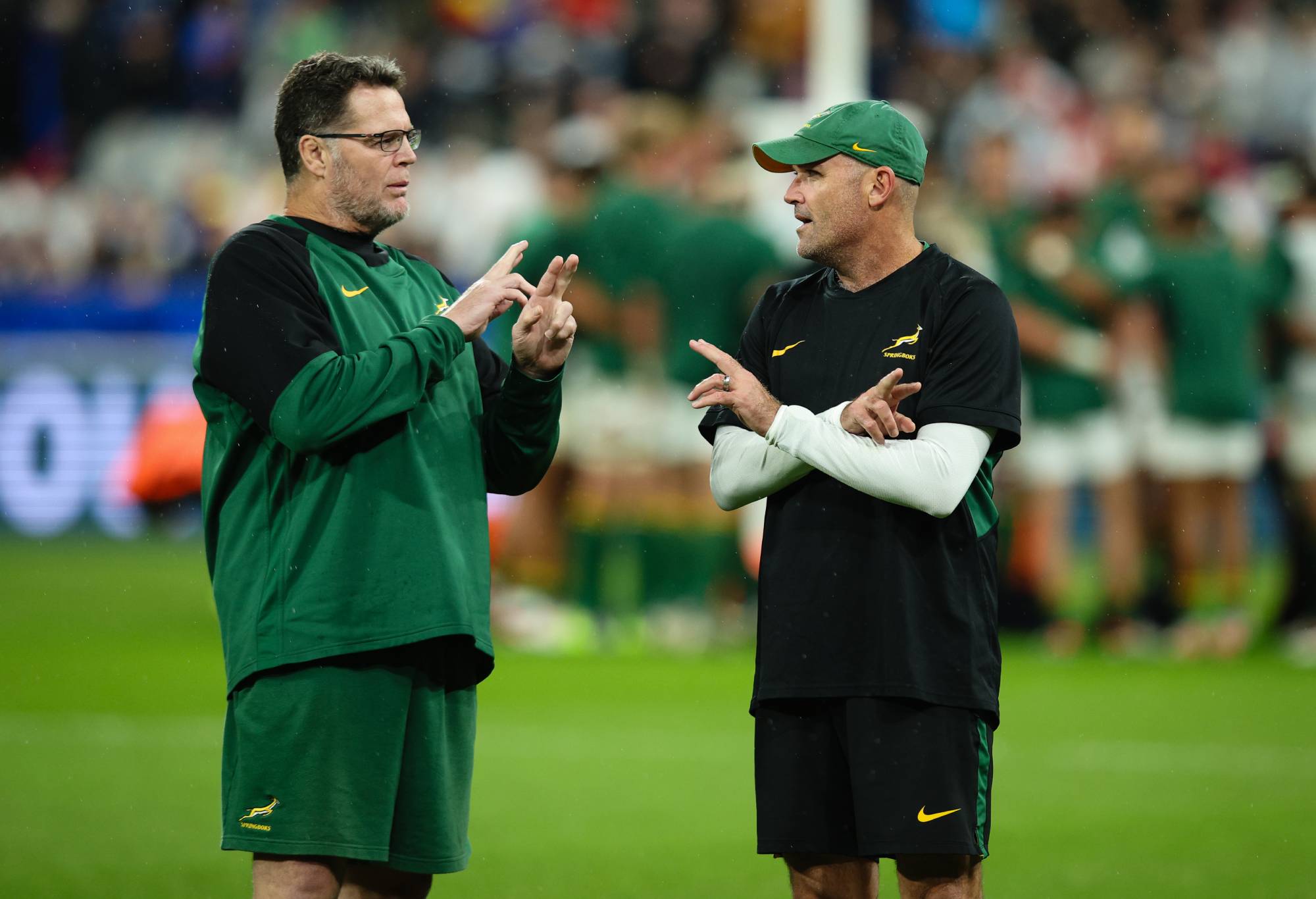
Rassie Erasmus and Jacques Nienaber. (Photo by Craig Mercer/MB Media/Getty Images)
Until Schmidt and Kiss are in a bad patch, perhaps with a new nine-ten-fifteen combination not clicking or differences in philosophy around optimal ruck number and kick return shape, we do not know if it will work.
It might.
Or it might become a frictional drama akin to so many before in a great rugby union nation who has lately become too full of drama.
Australia has played in ten Cups, won a fifth of them, hosted or co-hosted three, made the quarters until the last, and twice been runners up, but it is no understatement to say this is the most consequential Cup in rugby history for the 2027 hosts. The pools will finish in four short weeks this time, and the Wallabies will almost certainly win a new round of 16 match before the tournament tightens into quarters, but the fact remains: a winner will have to win four knockouts in a row.
Les and Joe or Joe and Les would not need to win all four, but two wins are non-negotiable and three wins the only way to truly spike interest in kids and sponsors and wider fans for a decade.
Formidable coaches stand in the way: all of them younger than Kiss and Schmidt, all of them more experienced than Kiss, and all of them running their own show.
But it might work. I hope it does, but I do not think it will.
